Republic 1918 of the year
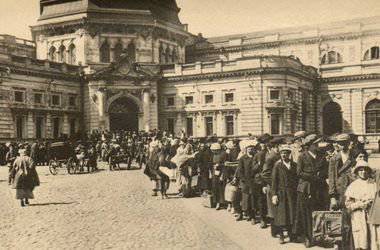
In a previous article published in the Segodnya newspaper last Saturday, I recalled Karamzin’s words: “History he comforts in state disasters, testifying that there have been similar before. ” Of course, the story is little consolation. Most people do not want to fall into any stories. They just want to live - work, raise children, build houses, go on holiday to their favorite places. That is, to stay not in the historical linear time, which promises all sorts of troubles, but in a cozy cyclical, where winter is guaranteed to be replaced in the spring, and the first course - the second and dessert.
But the story does not sleep, and every now and then plunges the gaping man in the street into the abyss of all sorts of disasters. Therefore, it is more useful to know all the same. Sometimes it helps better Corvalol. When the Crimea left, performances began in the South-East with the requirements of federalization and state status for the Russian language, and then suddenly, as if from nothing, a mysterious Donetsk Republic arose, surrounded by roadblocks, the boys and girls on TV first of all voiced a conspiracy. And I remembered the times of the distant 1918 year, when there was no TV yet, but on the territory of Ukraine, besides the Central Rada, there were the Odessa and Donetsk-Krivoy Rog republics, the Ukrainian Soviet government in Kharkov and the Crimean regional government of General Sulkevich. And a lot of other things, including the well-known Makhno father, which can be easily viewed by drawing historical parallels, as the leader of the Gulyaypol self-defense.
In general, it sometimes seems to me that since 1991, when Gorbachev fell in Moscow, we are experiencing a repetition of the great imperial crisis of 1917 — only slowed down in time. Passionaries today are much less than a hundred years ago. The average man, on the contrary, went up. Therefore, events unfold with less intensity. The fact that at the beginning of the last century it took years now takes decades.
CAPTURED RADA. Just as Maidan on the 2013 — 2014 scrapping was “woken up”, unwittingly, by the South-East (all events taking place there are just a tectonic push mirror from Western Ukraine), the Kiev Central Rada set an example in 1918. creativity of the masses "in the Crimea, Odessa and Kharkov. The Government of the Rada nobody chose, except the Rada itself. Its power in Kiev relied on several military units, or those who had gone over to the side of the new sovereigns, or were formed in haste, like Simon Petlyura's haidamaks. Outside of Kiev, this “order”, which arose, as if out of nothing, had no influence. Honestly, there was no power at all. The royal regime fell. The police also canceled the Petrograd Provisional Government. Bureaucracy was demoralized, and partly overclocked. Local government scared to death. Each enterprising citizen decided that his time had come, and rushed to drag "sovereignty" as much as he could.
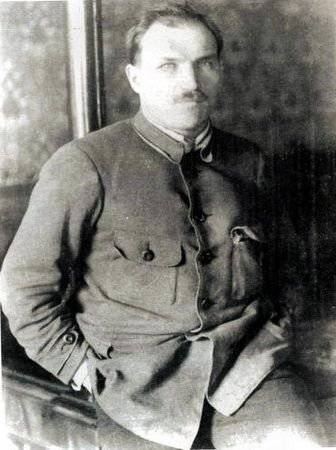
FREE CITY OF ODESSA. 3 January 1918, unexpectedly for all, declared itself the “free city” of Odessa. For some, this name sounds funny. But the “free city” is not an invention of cheerful Odessa citizens, but a European legal term. "Free cities" in Europe were called municipal communities that enjoyed the status of a state in a state. In the same 1918 year, when Odessa decided to add freedom to itself, there was a free city of Hamburg in Germany, and no one was laughed at. Hamburg really possessed special rights, and even the inhabitants of it served in special units of the German army, composed only of Hamburgers. And on the buckles of their belts flaunted the emblem of his native Hamburg.
You hardly know, dear reader, that even today Hamburg is officially called “the free and Hanseatic city of Hamburg” and has the status of one of the sixteen lands of the Federal Republic of Germany! That is all the same state in the state.
But the free city of Odessa was by no means out of a desire to imitate boring Germans cracking cabbage and sausages at the confluence of the former Slavic Elbe river into the cold North Sea. She had her own reasons and prerequisites. Odessa also arose as a matter of fact as a free city. From 1817 to 1859 year, according to the imperial decree of Alexander I, she enjoyed the status of "free port", translated from the French - a free port. Goods imported into it were not taxed. Russian imperial customs were already outside the city limits. The times of the Free French Odessans recalled as the golden age that laid the foundations for the prosperity of South Palmyra, as opposed to Palmyra North (St. Petersburg), the then journalists were pompously called "the pearl by the sea". So for me personally, there is nothing strange in the title “free city”, which the inhabitants of Odessa decided to protect themselves from the storm of revolution. They hoped that the Allies — the British and French — would enter Odessa and prevent the invasion of angry uncles on the carts headed by all sorts of Makhno and atamans Grigoriev, whose harsh star was just beginning to rise above the Tauride Steppe, reflected in the wall of the bottle with muddy moonshine.
But besides the Kiev government of the Central Rada, on the territory of Ukraine there existed, speaking the Odessa language, also its “rival firm” - the Ukrainian People's Republic of Workers ', Peasants', Soldiers 'and Cossacks' Soviets. This public education originated in Kharkov 25 December 1917 of the year at the First All-Ukrainian Congress of Soviets. He even had his own flag - red, but with a yellow-blue "canton" - an insert of national colors in the corner of the cloth. The political program of the Kharkiv Soviet government was a federation with red Russia (similar to joining the Customs Union), and the armed forces were Red Guard units. Do not believe it, but the government in Kharkov was officially called almost the same as that of the Central Rada - the People's Secretariat. He was elected head of a thirty-two-year-old electric Bolshevik Yefim Medvedev from Bakhmut, which is now renamed Artyomovsk.
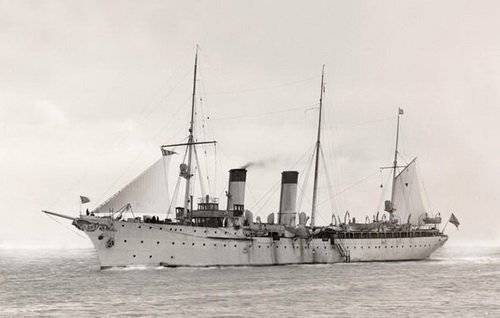
WHO LISTEN? Which of the two governments - Kiev or Kharkov - would be the overlord of the free Odessa, at that time it was still unclear. The first to impose on her sovereign hand tried Central Rada. 22 January 1918 of the year she claimed the rights to nine provinces of the former Russian Empire - including Kherson, in which magnificent Odessa at the time of the abdication of Nicholas II from the throne was a modest "county town", which clearly did not correspond to its financial power. The county town ... It even somehow does not fit in with the luxurious boulevards and beautiful buildings of Odessa, built in the Italian style. But it was so! In the same Kherson province, eighteen thousand Gulyai-Pole, with straight streets, two-story brick houses and an annual turnover of three million gold rubles, was also considered for some reason according to the documents ... a simple village. Although by the beginning of the last century, this close framework had already grown.
Be that as it may, exactly four days later, an uprising against the Central Rada broke out in the free city of Odessa. As in Petersburg, the Bolsheviks seized mail, telegraph and telephone. Then, as if by the way, also the station. And for a snack, they grabbed the headquarters of the Odessa Military District, which had sided with the Rada from the Provisional Government who had fallen in Petrograd. One part of the garrison sided with Kiev, the other decided that the main Secretariat was in Kharkov. Juncker military schools supported the Central Council. The Black Sea Fleet, on the contrary, is the Ukrainian Soviet Republic. But the turning point in the battle for the city was brought by the sailors in flares, pretty reddened at that historical moment. The old battered battleships of the Black Sea Fleet Rostislav and Sinop with the Almaz yacht that joined them (this vessel successfully even survived Tsushima!) Hit the main caliber of the positions of Kiev gaydamak and cadets in the area of Odessa-Tovarnaya station and secured the “pearl” »For the Bolsheviks. Instead of the “free city”, the Odessa Soviet Republic was declared - abbreviated OSR. The head of its armed forces was the Social Revolutionary, Lieutenant Colonel Muravyov - the one who in a few days will lead the attack on Kruty.
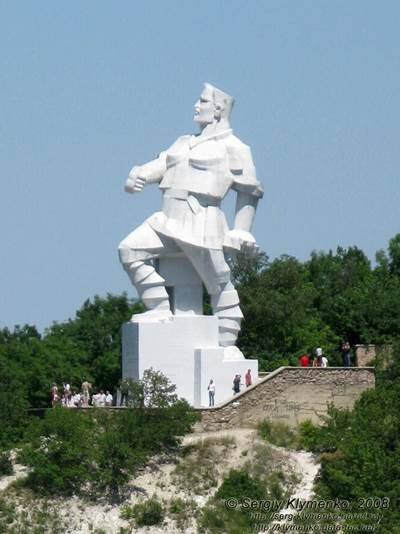
DONETSK ANSWER. And at this time not less than epochal events occurred in the Donbass. Everywhere, like mushrooms, new states began to arise and old ones revive. The edge of coal and steel could not stay away from such a process. The Donetsk phenomenon arose in the second half of the XIX century, when the British businessman John Hughes (in Russian it is often called Hughes) acquired from Prince Kochubey in the then Yekaterinoslav province on the bank of the Kalmius, a good earth and began to build a metallurgical plant. The newcomer Britt was one of the first to realize that it was in this then deserted land, by a happy coincidence, that ore, coke coal and asbestos are the three main ingredients for smelting metal. And next door is also the port of Mariupol, through which it is convenient to export steel and cast iron for export. In the Donbass began an industrial boom. To engage in the mines, thousands of former peasants poured into the lands of the Wild Field, where only rare nomads and herds of wild horses roamed recently. Salary was unusually high. Miners always had money. Dangerous work under the ground and a stable salary have created here a special type of person - in fact, a new Russian-speaking subethnos.
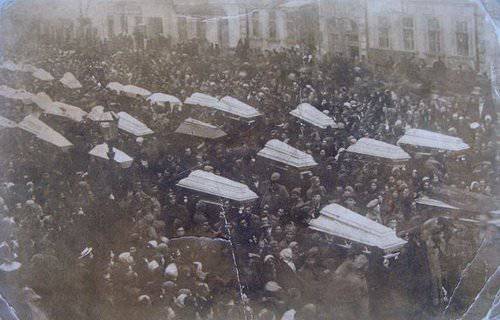
CULIUM NEGOTIATIONS. When in the summer of 1917, the Provisional Government in Petrograd began to negotiate with the Central Rada about the borders of the future autonomous Ukraine (at that time, Hrushevsky and his associates only claimed autonomy within Russia), the question of Donbass arose. Rada, of course, wanted to get him, well aware of the economic power of this region. But one of the local oligarchs, Nikolai von Ditmar, said in response: “The whole of this region, both industrially and geographically and in everyday life, seems to be completely different from Kiev. This whole area has its completely independent primary importance ... "
It was hard not to listen to the words of Ditmar, an influential businessman and one of the leaders of the Council of Congresses of Miners of South Russia (in revolutionary times, even the bourgeoisie created their own councils!). As a result of negotiations with the Central Rada, the Kerensky government left only five provinces under its control - Volyn, Kiev, Podolsk, Chernihiv and Poltava.
Only when the Provisional Government in Petrograd was overthrown by Lenin and Trotsky, was Rada's appetite increased, and she again began to lay claim to the Donbass. But by that time the influence of the local Bolsheviks had already increased. They were headed by the charismatic leader Fedor Sergeyev, by party nickname Artem, a professional revolutionary and a close friend of Stalin, who was still little known at that time.
In response to the claims of Grushevsky, the Congress of Soviets of Donetsk-Krivoy Rog Oblast gathered in Kharkov. He was already the fourth in a row and was by no means going to concede to Kiev. The resolute Donetans (among them were representatives of various revolutionary parties, but the majority were Bolsheviks and Social Revolutionaries) 12 February 1918, at the Metropol hotel, which means capital, proclaimed the creation of the Donetsk-Krivoy Rog republic.
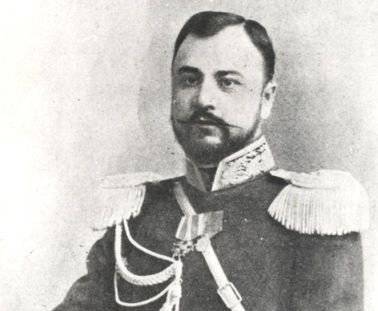
CRIMEAN REGION. By that time, the Central Rada was on the eve of the fall. Not possessing sufficient military strength and support of the masses, its leaders called on the German troops to Ukraine. Defending their choice, the new Donetsk Republic had to fight with them already.
While these events were developing on the mainland, the Soviet Socialist Republic of Tavrida emerged in the Crimea, proclaimed March 19 on March 1918. Like Donetsk, it was defeated by the advancing Germans. And right there they recognized the Crimean Regional Government of Matvey Sulkevich - a former Tsarist general of Tatar origin. In late April, a military coup took place in Kiev - the Central Rada was replaced by Hetman Skoropadsky. Without thinking twice, he claimed rights to the Crimea, turning to Sulkevich with a letter in Ukrainian. “I replied,” recalled the head of the independent Crimea, “that I am not a“ headman ”, but the head of government of an independent province, and that I ask to establish relations between us in a public language, in Russian. This act of mine was declared in Kiev "the severance of diplomatic relations." We, that is, the Crimean government, sent our ombudsman to Kiev to establish an economic agreement, but it there came across absolutely closed doors. ”
This situation developed in Ukraine at the height of the summer of 1918, when, under the German protectorate, the war of all and with all was temporarily stopped. But what happened then is worth remembering even in our tense days, in order to realize what our country really was from, and what “stitches” have been constantly forgotten in Kiev for the last twenty-three years.
Information